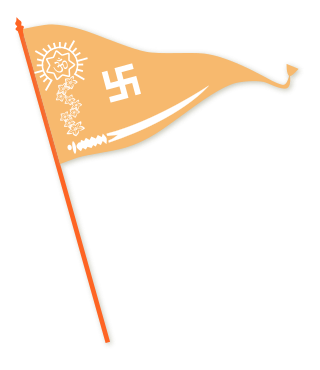Related Research Articles
Secularism is the principle of seeking to conduct human affairs based on naturalistic considerations, uninvolved with religion.
Hindutva is a political ideology encompassing the cultural justification of Hindu nationalism and the belief in establishing Hindu hegemony within India. The political ideology was formulated by Vinayak Damodar Savarkar in 1922. It is used by the Rashtriya Swayamsevak Sangh (RSS), the Vishva Hindu Parishad (VHP), the Bharatiya Janata Party (BJP) and other organisations, collectively called the Sangh Parivar.

Vinayak Narahari Bhave, also known as Vinoba Bhave, was an Indian advocate of nonviolence and human rights. Often called Acharya, he is best known for the Bhoodan Movement. He is considered as National Teacher of India and the spiritual successor of Mahatma Gandhi. He was an eminent philosopher. The Gita has been translated into the Marathi language by him with the title Geetai.
The Khilafat movement (1919–22) was a political campaign launched by Indian Muslims in British India over British policy against Turkey and the planned dismemberment of the Ottoman Empire after World War I by Allied forces.

Akhil Bharat Hindu Mahasabha is a Hindu nationalist political party in India.
Swarāj (Svarāja) sva "self", raj "rule") can mean generally self-governance or "self-rule". It was first used by Chhatrapati Shivaji Maharaj to attain self rule from the Mughal Empire and the Adilshahi Sultanate. Later, the term was used synonymously with "home-rule" by Maharishi Dayanand Saraswati and later on by Mahatma Gandhi, but the word usually refers to Gandhi's concept of Indian independence from foreign domination. Swaraj lays stress on governance, not by a hierarchical government, but by self-governance through individuals and community building. The focus is on political decentralisation. Since this is against the political and social systems followed by Britain, Gandhi's concept of Swaraj advocated India's discarding British political, economic, bureaucratic, legal, military, and educational institutions. S. Satyamurti, Chittaranjan Das and Motilal Nehru were among a contrasting group of Swarajists who laid the foundation for parliamentary democracy in India.
India since its independence in 1947 has been a secular state. The secular values were enshrined in the constitution of India. India's first prime minister Jawaharlal Nehru is credited with the formation of the secular republic in the modern history of the country. With the Forty-second Amendment of the Constitution of India enacted in 1976, the Preamble to the Constitution asserted that India is a secular nation. However, the Supreme Court of India in the 1994 case S. R. Bommai v. Union of India established the fact that India was secular since the formation of the republic. The judgement established that there is separation of state and religion. It stated "In matters of State, religion has no place. Any State government which pursues nonsecular on policies or nonsecular course of action acts contrary to the constitutional mandate and renders itself amenable to action under Article 356". Furthermore, constitutionally, state-owned educational institutions are prohibited from imparting religious instructions, and Article 27 of the constitution prohibits using tax-payers money for the promotion of any religion.

Gandhism is a body of ideas that describes the inspiration, vision, and the life work of Mohandas K. Gandhi. It is particularly associated with his contributions to the idea of nonviolent resistance, sometimes also called civil resistance.

Indian nationalism is an instance of territorial nationalism, which is inclusive of all of the people of India, despite their diverse ethnic, linguistic and religious backgrounds. Indian nationalism can trace roots to pre-colonial India, but was fully developed during the Indian independence movement which campaigned for independence from British rule. Indian nationalism quickly rose to popularity in India through these united anti-colonial coalitions and movements. Independence movement figures like Mahatma Gandhi and Jawaharlal Nehru spearheaded the Indian nationalist movement. After Indian Independence, Nehru and his successors continued to campaign on Indian nationalism in face of border wars with both China and Pakistan. After the Indo-Pakistan War of 1971 and the Bangladesh Liberation War, Indian nationalism reached its post-independence peak. However by the 1980s, religious tensions reached a melting point and Indian nationalism sluggishly collapsed in the following decades. Despite its decline and the rise of religious nationalism, Indian nationalism and its historic figures continue to strongly influence the politics of India and reflect an opposition to the sectarian strands of Hindu nationalism and Muslim nationalism.

Integral humanism was a set of concepts drafted by Deendayal Upadhyaya as a political program and adopted in 1965 as the official doctrine of the Jan Sangh and later BJP. The doctrine is also interpreted as 'Universal Brotherhood', an earlier theosophist and inturn Freemason inspired phenomenon. Upadhyaya borrowed the Gandhian principles such as sarvodaya, swadeshi (domestic), and Gram Swaraj and these principles were appropriated selectively to give more importance to cultural-national values. These values were based on an individual's undisputed subservience to nation as a corporate entity.
Secular spirituality is the adherence to a spiritual philosophy without adherence to a religion. Secular spirituality emphasizes the inner peace of the individual, rather than a relationship with the divine. Secular spirituality is made up of the search for meaning outside of a religious institution; it considers one's relationship with the self, others, nature, and whatever else one considers to be the ultimate. Often, the goal of secular spirituality is living happily and/or helping others.

Religion in India is characterised by a diversity of religious beliefs and practices. Throughout India's history, religion has been an important part of the country's culture and the Indian subcontinent is the birthplace of four of the world's major religions, namely, Buddhism, Hinduism, Jainism, and Sikhism, which are collectively known as native Indian religions or Dharmic religions and represent approx. 83% of the total population of India.
Atheism and agnosticism have a long history in India and flourish within the Śramaṇa movement. Indian religions like Jainism, Hinduism and Buddhism consider atheism to be acceptable. Doubt has been ingrained even in Indian spiritual culture. India has produced some notable atheist politicians and social reformers. Around 0.7 million people in India did not state their religion in the 2001 census and were counted in the "religion not stated" category. They were 0.06% of India's population. Their number has significantly increased four times, from 0.7 million in the 2001 census to 2.9 million in the 2011 census at an average annual rate of 15%. According to the 2012 WIN-Gallup Global Index of Religion and Atheism report, 81% of Indians were religious, 13% were non-religious, 3% were convinced atheists, and 3% were unsure or did not respond, while a demographic study by Cambridge University Press in 2004 found that around 2-6% of Indians identified as atheists or irreligious.
Hindu Revolution is a term in Hindu nationalism referring to a sociopolitical movement aiming to overthrow untouchability and casteism to unified social and political community to create the foundations of a modern nation.

The Bhagavad Gita, often referred to as the Gita, is a 700-verse Hindu scripture, which is part of the epic Mahabharata. The Bhagavad Gita is dated to the second half of the first millennium BCE. Even though Hinduism includes several denominations, the Gita holds a unique pan-Hindu influence as the most prominent sacred text. It has been noted that if there is any one text that comes near to embodying the totality of Hindu thought, it is the Bhagavad Gita.

The Pakistan National Congress (PNC), later known as the Bangladesh National Congress, was a political party that mainly represented the Hindus, Christians and other religious minorities in Pakistan. The party championed secularism in the Muslim-dominated state, and its electoral and organisational strength was mainly based in East Bengal.
Hindu nationalism has been collectively referred to as the expression of social and political thought, based on the native spiritual and cultural traditions of the Indian subcontinent. "Hindu nationalism" is a simplistic translation of हिन्दू राष्ट्रवाद. It is better described as "Hindu polity".

Neo-Vedanta, also called Hindu modernism, neo-Hinduism, Global Hinduism and Hindu Universalism, are terms to characterize interpretations of Hinduism that developed in the 19th century. The term "Neo-Vedanta" was coined by German Indologist Paul Hacker, in a pejorative way, to distinguish modern developments from "traditional" Advaita Vedanta.

Composite nationalism is a concept that argues that the Indian nation is made up of people of diverse cultures, castes, communities, and faiths. The idea teaches that "nationalism cannot be defined by religion in India." While Indian citizens maintain their distinctive religious traditions, they are members of one united Indian nation. Composite nationalism maintains that prior to the arrival of the British into the subcontinent, no enmity between people of different religious faiths existed; and as such these artificial divisions can be overcome by Indian society.
The All India Conference of Indian Christians (AICIC) is an ecumenical organisation founded in 1914 to represent the interests of Christians in India. It was founded to advocate for the moral, economic, and intellectual development of the Indian Christian community. The All India Conference of Indian Christians held its first meeting on 28 December 1914 and was led by Raja Sir Harnam Singh of Kapurthala, who was the president of the National Missionary Society (NMS); the first AICIC General Secretary was B. L. Rallia Ram of Lahore. Its creation united local and regional Indian Christian Associations, which existed in Bombay, Madras, Hyderabad, Punjab, United Provinces, Bengal and Burma, under one umbrella organisation. At the time of the Indian independence movement, the organisation allied itself with the Indian National Congress and the resolutions passed by All India Conference of Indian Christians advocated communal harmony, while also pressing for the rights of Christians in both colonial India and independent India. The India Conference of Indian Christians advocated for self-rule in a united and independent country, opposing the partition of India. During the era of the British Raj in India, the AICIC served as the mouthpiece for members of the Indian Christian community, conducting membership drives to boost its base, which included Protestant and Catholic Christians. As such, the presidents of the AICIC represented the Christians of undivided India at the Round Table Conferences.
References
- ↑ Haynes, Jeffrey (2020). Peace, Politics, and Religion. MDPI AG. p. 90. ISBN 978-3-03936-664-4.
- ↑ Rakhit, Maanoj (29 July 2013). RKM Propagating the Opposite of What Vivekananda and Ramakrishna Had Said: Call to the Rank and File at RKM! Stand Up and Uphold the Truth. Maanoj Rakhit. ISBN 9788189746490.
- ↑ Losonczi, Peter; Van Herck, Walter (2017). Secularism, Religion, and Politics: India and Europe. Routledge. p. 33.
- ↑ Smith, Donald E (2011). India as a Secular State . Princeton University Press. ISBN 9781178595253.
- ↑ Larson, Gerald James (2001). Religion and Personal Law in Secular India: A Call to Judgment. Indiana University Press. ISBN 0-253-33990-1.